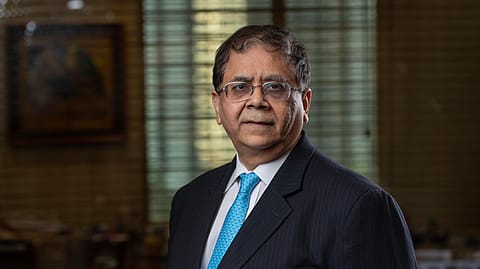India's financial sector seeing 'heavy-handed' action by regulators: Cyril Shroff
Cyril Shroff says there needs to be more balance, predictability, and transparency when regulating banks, fintech companies, and payment entities.

There is a dominant feeling in the markets that financial regulators in India are unpredictable and too intrusive, according to Cyril Shroff, the managing partner of Cyril Amarchand Mangaldas.
"Heavy regulation is not a problem per se. It's about whether they are predictable or not and oppressive. We have seen in the last one year that there has been excessive heavy-handed action against several segments of the financial community and if you are going to have that kind of approach, I think the financial markets are not going to be supportive," Shroff says in a pre-Budget discussion hosted by Fortune India.
"I talk to a number of players in the financial markets and all of them are quite demotivated in terms of the heavy-handed action that comes," Shroff says, adding that there needs to be more balance, predictability, and transparency. "Whether you look at banks, fintech companies, payment entities. You name it. There is excessive heavy handed action," he says.
While sharing his recommendations for the upcoming Budget, Shroff says the government should bring in more reforms and be bold on critical things. “GDP figures were a bit of a googly for the government. I don’t think they saw it coming. But India always does well in the second innings. This is an opportunity to make some more reforms,” says Shroff.
On regulatory overreach, Gopal Krishna Agarwal, the national spokesperson of Bharatiya Janata Party (BJP) for economic affairs, says “overzealous administration” creates harassment at times. “Indians are not averse to paying taxes if this fear of harassment, overzealous bureaucracy and administration is taken away,” Agarwal says, adding that this has been brought to the knowledge of the finance ministry.
Cyril Amarchand Mangaldas’ Shroff says one of the biggest problems foreign investors face is enforcement of contracts. “These are very old problems. That fact that this has continued for so long, therefore the lack of trust that foreign investors have in the Indian regulatory and enforcement system is a big problem,” he says. “This results in two things: either they avoid the country altogether or find a way of outsourcing arbitrations, none of which augurs well. It is having an impact and will continue to have an impact on FDI (foreign direct investment),” explains Shroff.
“I don’t understand how we can move towards a developed economy if we don’t fix legal infrastructure. It needs to be treated as a priority and typically what happens is it is slowest on the agenda. Nobody seems to be interested in really solving this in a meaningful way. Something should be done about the rule of law and the dispute resolution system has to find a way in the national priorities,” he says, adding that foreign investors are put off by extremely onerous system. “We talk about Make in India, then why can’t we resolve in India.”
Recommended Stories
Shroff believes India needs its own version of DOGE (Department of Government Efficiency) like the U.S. for improving government efficiency. “If you look at this from an entrepreneur point of view, the framework of just getting business done is so onerous right now from setting up a company and compliance. At some stage, somebody has to make this a very important part of the agenda to simplify how business is done in India. We talk a lot about ease of doing business but on the ground, every entrepreneur knows it’s terrible. Unless, you fix that, it’s not going to provide the kind of impetus to growth that we see in a more developed country,” he states.
Taxation, too, continues to be a problem, according to Shroff. “Our tax code is complicated and so unpredictable. If we want to Make India Great Again, then we need to have a more simplified and predictable tax system,” he adds.
The full transcript of the round table discussion will appear in the January 2025 issue of Fortune India.